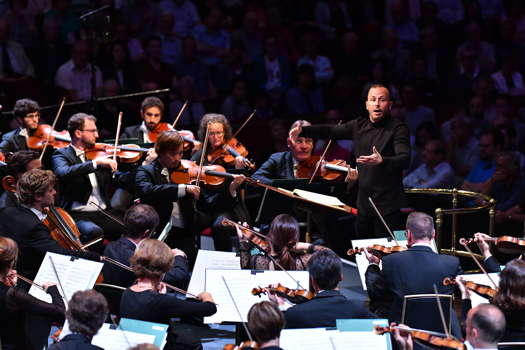- Giuseppe Guttoveggio
- David Alden
- Hans Barth
- Mervyn Burtch
- Michael Finnissy
- Trondheim
- Swing low sweet chariot
- Andromeda Sax Quartet
 WORD SEARCH: Can you solve Allan Rae's classical music word search puzzles? We're currently publishing one per month.
WORD SEARCH: Can you solve Allan Rae's classical music word search puzzles? We're currently publishing one per month.
 DISCUSSION: What is a work? John Dante Prevedini leads a discussion about The performing artist as co-creator, including contributions from Halida Dinova, Yekaterina Lebedeva, Béla Hartmann, David Arditti and Stephen Francis Vasta.
DISCUSSION: What is a work? John Dante Prevedini leads a discussion about The performing artist as co-creator, including contributions from Halida Dinova, Yekaterina Lebedeva, Béla Hartmann, David Arditti and Stephen Francis Vasta.
Magnificent Symphonies
Beethoven, Shostakovich and Musorgsky
from Yannick Nézet-Séguin and
the Bavarian Radio Symphony Orchestra
impress PATRICK MAXWELL
The anticipation that greeted the players of the Bavarian Radio Symphony Orchestra when they approached the stage of the Royal Albert Hall [BBC Proms, 30 July 2019] gave the sense that the audience was in for a treat. The programme was bold; Beethoven's Second may be seemingly effervescent but requires real skill to take to a new level, and Shostakovich's Fifth is a lengthy, morose piece that can be musically and politically interpreted in many ways.
The orchestra's brilliance was even more stunning for the circumstances. Mariss Jansons had been planning to perform Shostakovich's Tenth but has been taken ill, so the Canadian head of the New York Metropolitan Opera, Yannick Nézet-Séguin had to step in. The music was changed to a piece that Shostakovich wrote in a period of huge personal turmoil, the Fifth. That could indeed be said of both pieces, with Beethoven writing his Second at a time when his hearing had deteriorated to such a degree that he contemplated suicide. 'A little more and I would have ended my life' he said in the ‘Heiligenstadt Testament' of 1802. Music was the salvation: 'Only my art held me back.'
The fact that the orchestra had less time to assume the new music never showed in the performance - the sound was the most sophisticated, elegant and simply musical that can be heard in Britain at the moment. The Beethoven was fizzling with vibrancy, overshadowing the deep personal trauma that the composer felt at the time of writing. Like Chopin, it is often difficult to instantly detect the personal emotions of Beethoven in his often seemingly effusive music of this period. The grandiose Adagio start was superbly handled by the energetic string section producing a captivatingly full sound that consumed the huge space of the hall. The notes bounced off the strings, and the scales that dominate much of the first movement were equally virtuosic.
The energy continued throughout the whole piece, culminating in the morphing from D minor to the major at the end, a composed finale that was rapturously received at the interval.
Shostakovich's Fifth can be misunderstood and also intellectualised to a servile degree. The article in Soviet state-backed magazine Pravda that was possibly written by Stalin himself had dismissed the new opera The Lady Macbeth of Mtsensk District as 'Muddle instead of music', putting the composer in real danger. He scrapped the planned performance of the fourth symphony and pressed on with a Fifth that would please the threatening authorities. The atmosphere of 1937 Leningrad was extremely fraught, with the daily repressions already beginning. Many in the audience at the premiere would have lost family members on trumped up charges, all of this before the gruesome Siege of 1941-44 and the famous Seventh that so terrified the invading Germans. With many in tears by the end of the Largo third movement, a standing ovation started in the middle of the final Allegro. At the end of the boisterous finale a strange sense of unnerving hysteria can be felt. Shostakovich knew that he had to produce a piece that would please Stalin, and the glittering major nature of the last movement provided that, and secured that he could live. Whether it is really authentic is a question that no music student can ever fully answer.
The performance itself was masterly. From the startling opening, Nézet-Séguin drew in the whole audience with his poised players, and the deeply moving third movement was staggeringly muted and yet also enchanting. By the end, the audience gave their full appreciation, and the orchestra gave an encore of Musorgsky's Dawn on the Moskva River from the opera Khovanshchina, a suitably serene end.

Yannick Nézet-Séguin and the Bavarian Radio Symphony Orchestra at the Royal Albert Hall on 30 July. Photo © 2019 Chris Christodoulou
The Bavarian Radio Symphony Orchestra gave a concert that gave off the evident impression of effortless superiority, and firmly cemented themselves along with the BBC Symphony Orchestra as one of the finest ensembles of their type. For the first time in my life, I stood to applaud the players as the packed hall asked for an encore. I left more fulfilled, stunned and enriched than I ever have before, and it is certainly time we hailed these players for the superlative musicians they are.
Copyright © 31 July 2019
Patrick Maxwell,
Oxford, UK



